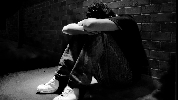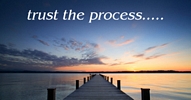“The way up is down .” I’ve heard that expression so many times I’m sick of it. But I keep hearing it… because it is so paradoxically true.
Why is it that much of our relationship with God involves loss, suffering and sacrifice? Why does God call us so often to leave what we like, to release hold of what we grasp? Why is the path of godliness so often a difficult and dangerous road? Why does it seem that much of our ‘lot in life’ is about pain—having to live often in the valley of barrenness and brokenness?
“The healing path,” Dan Allender says, “must pass through the desert or else our healing will be the product of our own will and wisdom” (from The Healing Path, 1999). Our God—the God of Abraham, Isaac, and Jacob—makes a very dangerous claim in our hyper-tolerant, politically correct world: You shall have no other gods before Me. Imagine the hubris of such a jealous, exclusive, singular claim in our inclusive world of myriad gods and idolatries! No wonder God makes the godless so angry and out-of-sorts. Yet do we Christians really understand how dangerous our God really is to us as well? This is a broken world and we will experience pain and suffering that even breaks the heart of God. But even more, do we really understand the consequences of ignoring Him, of putting other gods—fame, sex, power, money, comfort, our ‘own will and wisdom’— before Him?
The Egyptian Pharaoh was a god-like ruler who, when challenged by Moses to let the Hebrew slaves go free, hardened his heart toward God (review the Exodus story). God sent Egypt one plague after another until Pharaoh’s will was broken, and the Israelites were set free. Pharaoh was touched by a dangerous God— The Paradox of a Dangerous God and experienced His fierce mercy—in order to learn that God was God, and he was not. Are you resisting God, playing God yourself, and refusing to act where God has made it clear that He wants your obedience? Reflect on the losing outcome of fighting God, and remember that He desires our obedience for His glory and our best.
Samson, one of history’s strongest men, was a moral weakling when it came to his desire for, and lust after, Delilah, a Philistine woman (Judges 16). Putting her before God led to betrayal that led to the loss of his strength, and the destruction of his eyesight by his enemies. Yielding to the temptation of haunting beauty resulted in the loss of ability to see anything— beauty traded for darkness. Does the lust of your eyes lead you constantly astray? Will you trade your wonderful wife and delightful children for the tempting beauty that lures you to a one-night stand?
Listen to Allender again: “It is in the poverty of the desert that we see clearly our attachments to the trinkets and baubles we cling to for security and pleasure. The desert shatters the soul’s arrogance and leaves body and soul crying out in thirst and hunger. In the desert, we trust God or die… To get to the table set for us by God we are called to walk through danger… Danger [that] strips us of the presumption of independence… danger [that] brings us to our knees… danger [that] calls us to cling to the hem of the one who leads us to safety.”
Here is the paradoxical truth that shatters all illusions of self-sufficiency, independence and personal goodness: Not only can we not save ourselves; we cannot grow up and walk with Him by ourselves. We must not only identify with Christ on the Cross and be risen with Him in new life to be saved (justified), but to be sanctified, and one day glorified, we must “die daily” to self, as Paul put it (1 Cor. 15:31), and live dynamically in Christ every waking moment. None of this is our work—we don’t even will or want it if we are truly honest with ourselves. God himself wills and works it all within us, so that one day the One who calls himself I AM will “be all in all” (1 Cor. 15:28). It is a mystery beyond words. The prayer stated by the poet in the Christian classic, The Valley of Vision, says it all:
_Lord, High and Holy, Meek and Lowly, Thou hast brought me to the valley of vision, Where I live in the depths but see thee in the heights; Hemmed in by the mountains of sin I behold thy glory. Let me learn by paradox That the way down is the way up, That to be low is to be high, That the broken heart is the healed heart, That the contrite spirit is the rejoicing spirit, That the repenting soul is the victorious soul, That to have nothing is to possess all, That to bear the cross is to wear the crown, That to give is to receive, That the valley is the place of vision… Let me find Thy light in my darkness, Thy life in my death, Thy joy in my sorrow, Thy grace in my sin, Thy riches in my poverty, Thy glory in my valley._
The God who loves you has shown a Supreme Love—has sacrificed His only begotten Son so that you and I are able to come to Him washed clean of our sins and our selfishness. By Christ’s own willingness to climb up on that Cross and die a tortured death, God has forgiven us all, if we will appropriate that power. But He hates it when we cavort with sin and evil. He is a jealous God who is rightly angered when we love other things in the world more than Him. He warns us that there are consequences to our choices. Choosing the way of death yields death.
Yet, choosing the way of life yields His life and peace and contentment forevermore. And to choose life is to die daily to self, to embrace the Death of Him who gave Himself up so that we might live now and forevermore in Him.Take help from telephone psychologist .
_Tim Clinton, Ed.D., LPC, LMFT, is President of AACC, Executive Director of the Center for Counseling and Family Studies/ Professor of Counseling and Pastoral Care at Liberty University, and co-founder of Light Counseling, Inc., a clinical practice serving children, adolescents, and adults. Dr. Clinton is author and co-author of Before a Bad Good-bye, Attachments: Why You Love, Feel and Act the Way You Do and Competent Christian Counseling. He is executive editor of The Soul Care Bible._



